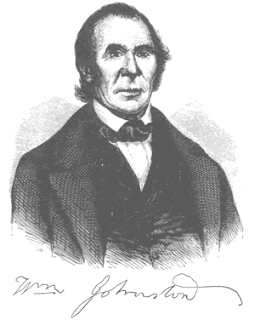 |
| Drawing of Bill Johnston circa 1840 taken from a portrait |
Johnston reportedly reminded the men that all the recent trouble could have been avoided if the British had not confiscated he property illegally in 1813. He acknowledged the twin navies—American and British—looking for him but bragged he couldn't be captured. His words later made it to local papers.
"One thing you may rest assured of, I will never be taken alive. I am a fair mark to shoot at but I am not a man to dangle in the air. Whoever comes after me must bring his own coffin, as I have no leisure for cabinetmaking. I have two other boats, well manned and armed, within signal view. I am sitting on the colors of the Sir Robert Peel and mean to continue sitting on them till they rot. Steam boats on the lakes need have no fear of me. I have no intention of molesting them." He added that he was now fully avenged for the sinking of the Caroline.
Bill Johnston Saluted by Ship Passengers
The river rendezvous dissolved. As Johnston's ship passed heading downstream, an Oswego passenger waved a white handkerchief in salute. Johnston, always a bit of a showman, returned the gesture. He stood up and unfurled the flag taken from the Peel and let it flutter for a minute in the river breeze.Two days later, passengers on the steamer Oneida spotted Johnston and waved their handkerchiefs. Again, he returned the gesture by unfurling the Peel's flag.
Aside: Spotting Bill Johnston became a major pastime that summer. He was reported regularly in the company of ever larger gangs of men. Many reports are undoubtedly inaccurate and likely contrived.
Johnston's freedom of movement and unbridled cheekiness added fuel to the fire already started by his destruction of the Peel. His ability to evade capture was later acknowledged by the commandant of Fort Henry, Johnston's arch foe Lt.-Colonel Sir Richard Bonnycastle, in his 1852 book, Canada, As it Was, Is and May be.
"Bill Johnson laughed at the efforts of the Governor and all the authorities. The Thousand Islands afforded him a secure retreat, and amongst their intricacies he hid his boats and his men. In vain, parties of sailors from Kingston examined them [the islands]; they were occasionally fired at by an unseen and vanishing enemy. The American Militia and Civil officers were equally unsuccessful, capturing about 250 pikes, but no pikemen."
Despite the difficulties, Bonnycastle did not give up hunting Johnston, though on one occasion Johnston struck back.

0 comments:
Post a Comment